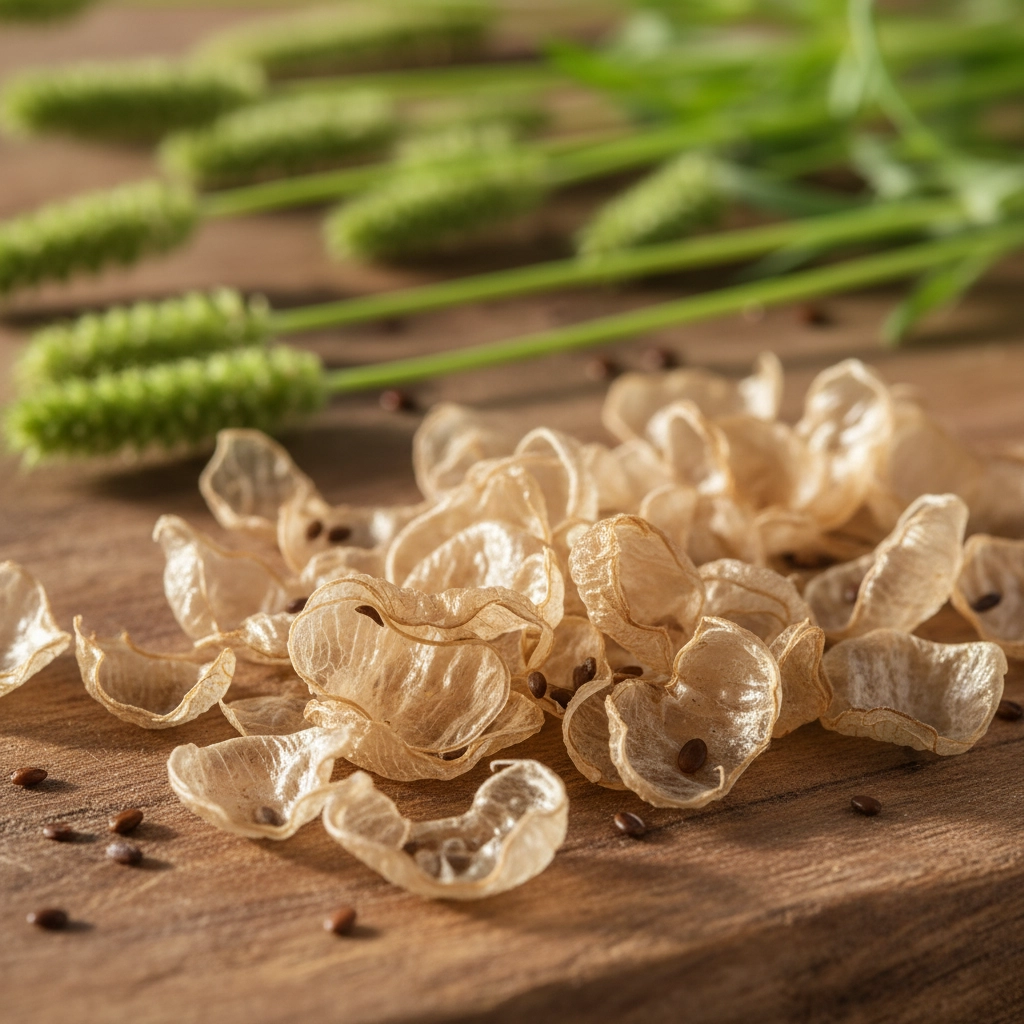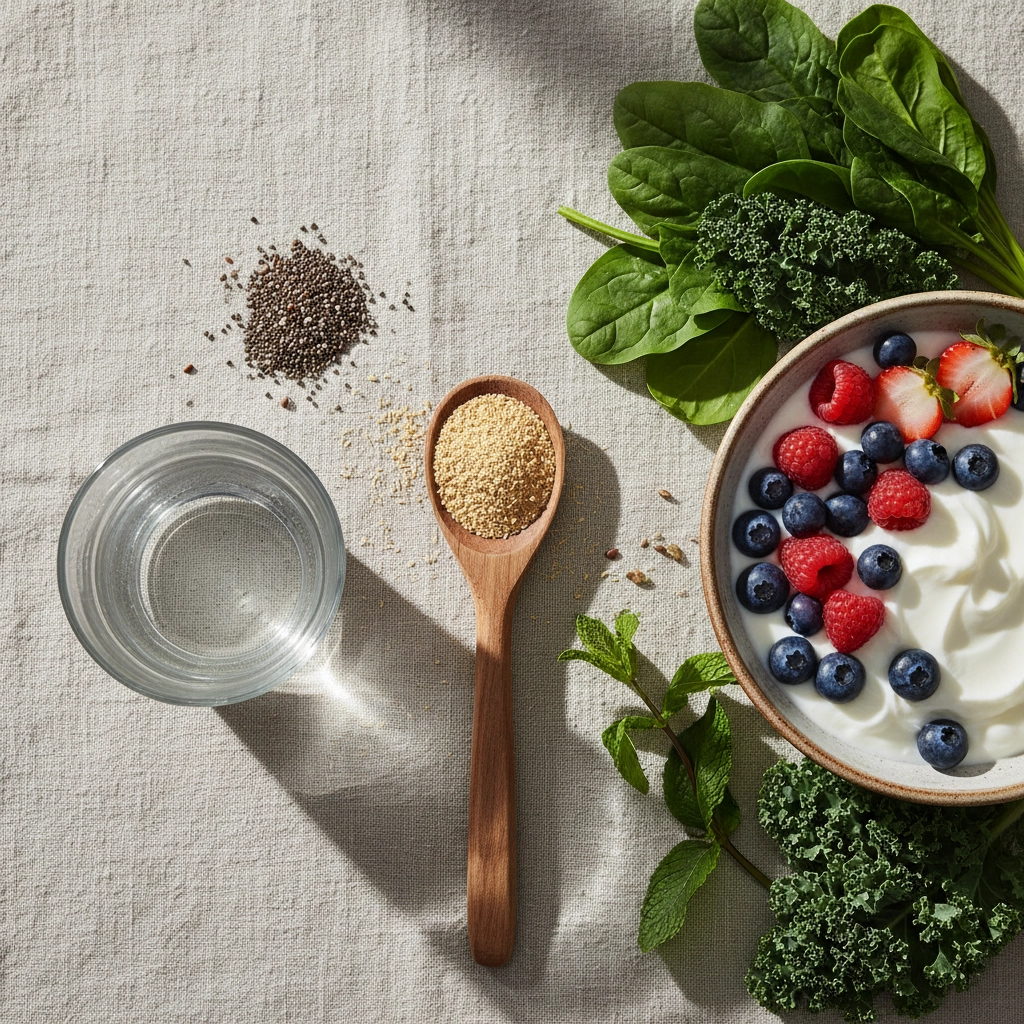Ever feel like your digestive system could use a gentle nudge in the right direction? Meet psyllium husks: one of nature's most effective and gentle fiber sources that's been quietly supporting gut health for centuries. These tiny seed husks from the Plantago ovata plant might look unassuming, but they pack a serious punch when it comes to digestive wellness.
Unlike harsh laxatives or complicated supplements, psyllium husks work with your body's natural processes to promote regularity, support gut health, and even help you feel more satisfied after meals. Let's dive into why this simple fiber powerhouse deserves a spot in your daily wellness routine.
What Exactly Are Psyllium Husks?
Psyllium husks come from the seeds of Plantago ovata, a plant that's been cultivated for over 1,000 years, primarily in India and other parts of Asia. The husks are the outer coating of these seeds, and they're incredibly rich in soluble fiber: the kind that dissolves in water to form a gel-like substance.
This gel-forming ability is what makes psyllium husks so special. When you mix them with liquid, they create a thick, mucilaginous consistency that works wonders as it travels through your digestive system. Think of it as nature's way of giving your gut a gentle, supportive hug.

How Psyllium Husks Support Your Digestive System
The Gentle Bulking Effect
When psyllium husks hit your digestive tract, they absorb water and expand, creating soft, bulky stools that are much easier to pass. This isn't the harsh, cramping action you might experience with stimulant laxatives. Instead, it's a gentle, natural process that helps normalize your bowel movements whether you're dealing with constipation or loose stools.
The beauty of psyllium is its adaptability. If you're constipated, it adds moisture and bulk to help things move along. If you're dealing with loose stools, it absorbs excess water to help firm things up. It's like having a natural regulator for your digestive system.
Feeding Your Good Gut Bacteria
Here's where things get really interesting. Psyllium husks aren't just a one-and-done fiber source: they're also a prebiotic. This means they feed the beneficial bacteria in your gut, helping to maintain a healthy microbiome balance.
As psyllium slowly ferments in your colon, it produces short-chain fatty acids like butyrate, which are incredibly important for gut health. These fatty acids help reduce inflammation, strengthen your intestinal barrier, and support overall digestive wellness.
The Real Benefits You'll Actually Notice
Better Regularity Without the Drama
Most people notice improved regularity within a few days of adding psyllium husks to their routine. But this isn't the urgent, uncomfortable experience you might expect from other fiber supplements. Instead, you'll likely find yourself naturally having more regular, comfortable bowel movements.
Many people find they can reduce their reliance on other digestive aids once psyllium becomes part of their routine. It's gentle enough for daily use and doesn't create dependence like some other options might.
Feeling Fuller, Naturally
One of the unexpected benefits many people discover is that psyllium husks help them feel more satisfied after meals. The gel-forming fiber slows down digestion, which means you feel full longer and are less likely to reach for snacks between meals.
This isn't about restrictive dieting: it's about supporting your body's natural hunger and satiety cues. When your digestive system is working smoothly and you're absorbing nutrients properly, you naturally feel more balanced and satisfied.

Supporting Heart Health
The benefits don't stop at digestion. The same gel-forming action that helps with regularity also binds to cholesterol in your digestive tract, helping your body eliminate it before it can be absorbed. Some studies suggest that regular psyllium intake can help support healthy cholesterol levels as part of an overall healthy lifestyle.
Steadier Energy Levels
By slowing down the absorption of sugars from your meals, psyllium husks can help prevent those post-meal energy crashes. This gentle regulation of blood sugar absorption means more stable energy throughout the day.
How Psyllium Husks Help Support Healthy Blood Sugar
Psyllium is a soluble, gel-forming fiber. When you mix it with water, it becomes a thick gel that moves slowly through the stomach and small intestine. That gel does three helpful things:
- Slows how fast the stomach empties, so sugar from your meal enters your bloodstream more gradually
- Makes it harder for enzymes to rapidly break down carbs, so glucose is absorbed more slowly
- Feeds gut bacteria that produce short-chain fatty acids (like butyrate and propionate), which may support insulin sensitivity and a healthy gut lining
What the research shows: Multiple clinical studies and meta-analyses find that taking psyllium regularly with meals can lower post-meal glucose and insulin spikes and modestly improve fasting glucose and A1C over time. It works best alongside a balanced diet, daily movement, and good sleep.
Everyday ways to use psyllium for blood sugar support:
- Before carb-heavy meals: Take 1 teaspoon of psyllium in a large glass of water 10–30 minutes before your most carbohydrate-heavy meal (like breakfast oatmeal or a rice/pasta dinner). Follow with another glass of water.
- Smoothie add-in: Blend 1 teaspoon into your morning smoothie and drink soon after mixing.
- Yogurt and berries: Stir a teaspoon into Greek yogurt with berries for a snack that naturally slows sugar absorption.
- Soups and stews: Use a small amount as a natural thickener when the meal includes bread or rice.
- Baking days: Add a small amount of psyllium husk powder to homemade breads or tortillas to boost soluble fiber.
- Remember the basics: Keep psyllium at least 2 hours away from medications and supplements, and always pair it with plenty of water. Start small and increase slowly as comfortable.
- If you track glucose: Watch for gentler post-meal curves. If you use diabetes medications or insulin, check with your healthcare provider before starting, as psyllium may enhance glucose-lowering and could require dose adjustments.
Easy Ways to Add Psyllium Husks to Your Daily Routine
Start Small and Simple
The key to success with psyllium husks is starting slowly and staying consistent. Begin with just one teaspoon mixed into a large glass of water, and drink it immediately before it has a chance to gel up too much. Follow it with another glass of plain water.
Many people find it easiest to take psyllium first thing in the morning or about 30 minutes before their largest meal of the day. This timing helps with both digestive regularity and satiety.
Creative Ways to Take Psyllium
While the classic water mix works great, you don't have to stick with just that:
- Smoothie booster: Add a teaspoon to your morning smoothie for extra fiber without changing the taste much
- Yogurt mix: Stir it into Greek yogurt with some berries for a gut-healthy snack
- Baking substitute: Use small amounts in baking as an egg replacer or fiber booster
- Soup thickener: Add a small amount to soups or stews as a natural thickener
The Golden Rules for Success
Timing matters: Take psyllium at least two hours away from medications or other supplements, as it can interfere with absorption.
Water is your friend: Always, always drink plenty of water when taking psyllium. The fiber needs liquid to work properly, and skimping on water can actually cause constipation.
Consistency beats intensity: A small amount daily is much more effective than larger amounts taken sporadically.

Safety and What to Expect
Psyllium husks are generally very safe for most people, but like any supplement, it's worth knowing what to expect. Some people experience mild bloating or gas when they first start taking psyllium, but this usually resolves within a week or two as your system adjusts.
If you have any digestive conditions, are taking medications, or are pregnant or nursing, it's always smart to check with your healthcare provider before starting any new supplement routine.
Signs You're Taking Too Much
Your body will usually tell you if you're overdoing it with psyllium. Signs include excessive bloating, cramping, or changes in bowel movements that don't feel comfortable. If this happens, just reduce your dose and make sure you're drinking enough water.
Making Psyllium Part of Your Natural Wellness Journey
What makes psyllium husks so appealing is how well they fit into a natural, holistic approach to health. They're not about quick fixes or dramatic changes: they're about supporting your body's natural processes consistently and gently.
For those focused on natural wellness, psyllium represents the kind of simple, time-tested solution that works with your body rather than against it. Combined with a balanced diet, adequate water intake, and regular movement, psyllium can be a cornerstone of digestive wellness.
The best part? Once you establish a routine with psyllium husks, they become almost invisible: just a simple part of your day that keeps your digestive system humming along smoothly. No drama, no urgent trips to the bathroom, just steady, reliable digestive support that lets you focus on living your life.
Whether you're looking to improve regularity, support your gut microbiome, or simply feel more comfortable in your own skin, psyllium husks offer a gentle, natural path forward. Sometimes the most powerful wellness tools are also the simplest ones, and psyllium husks are a perfect example of nature getting it right.





